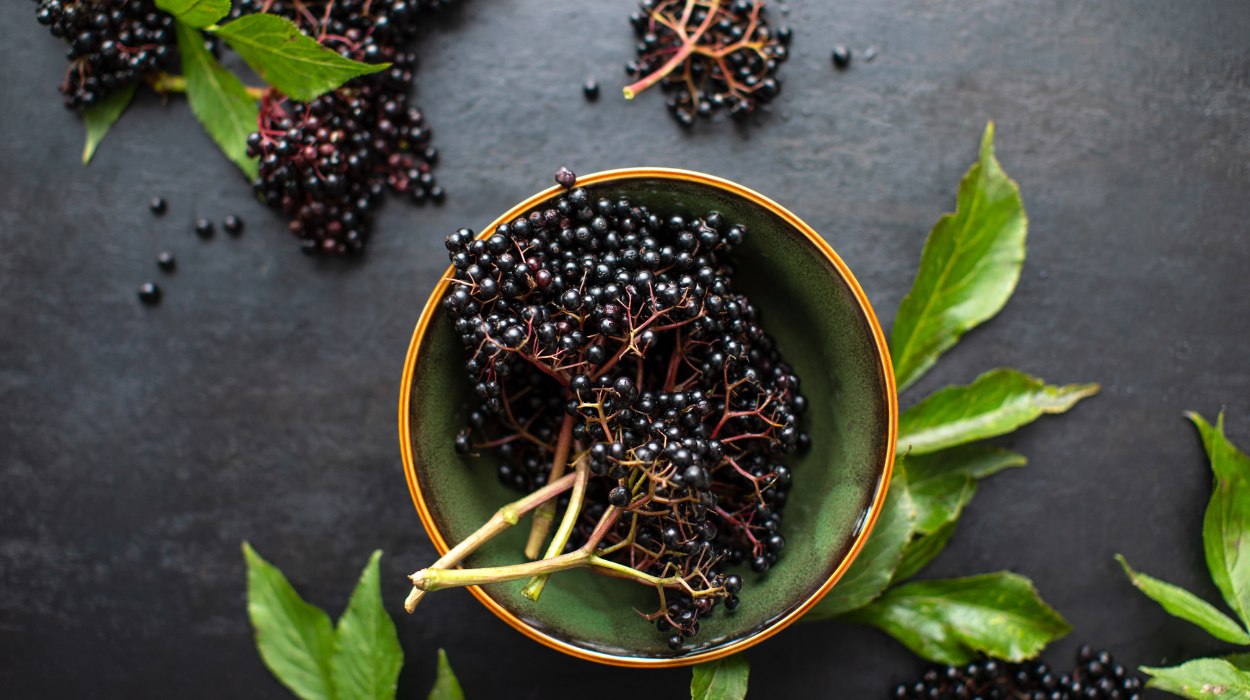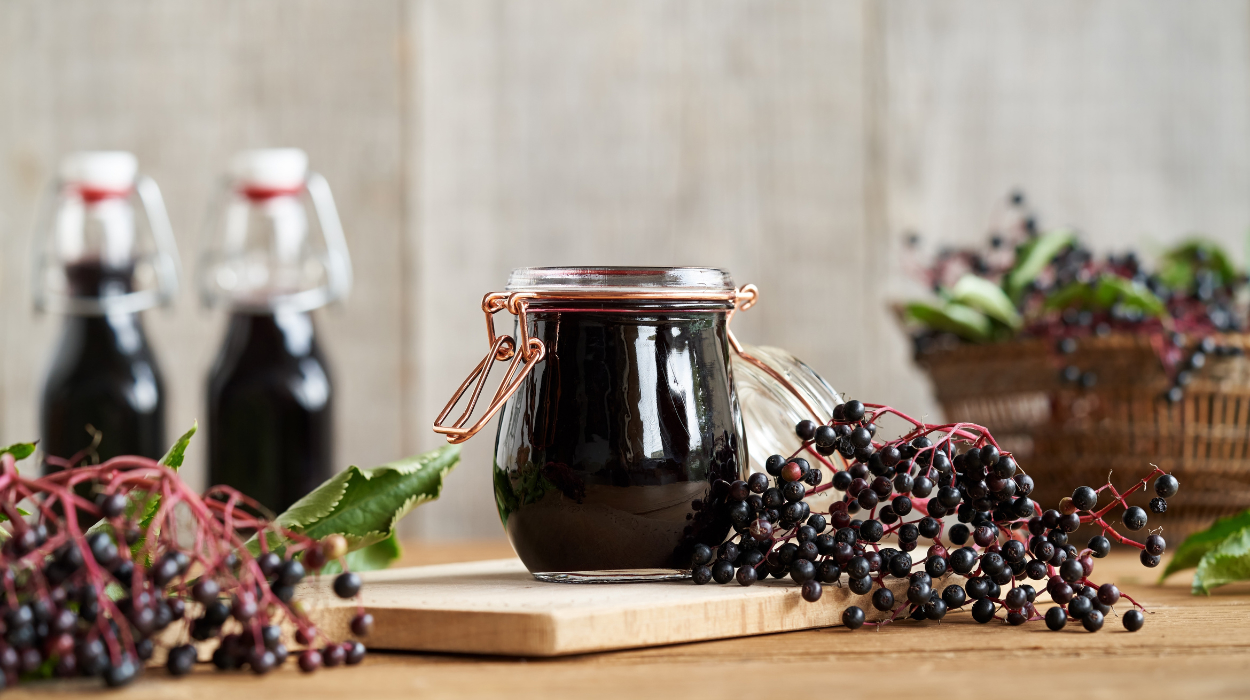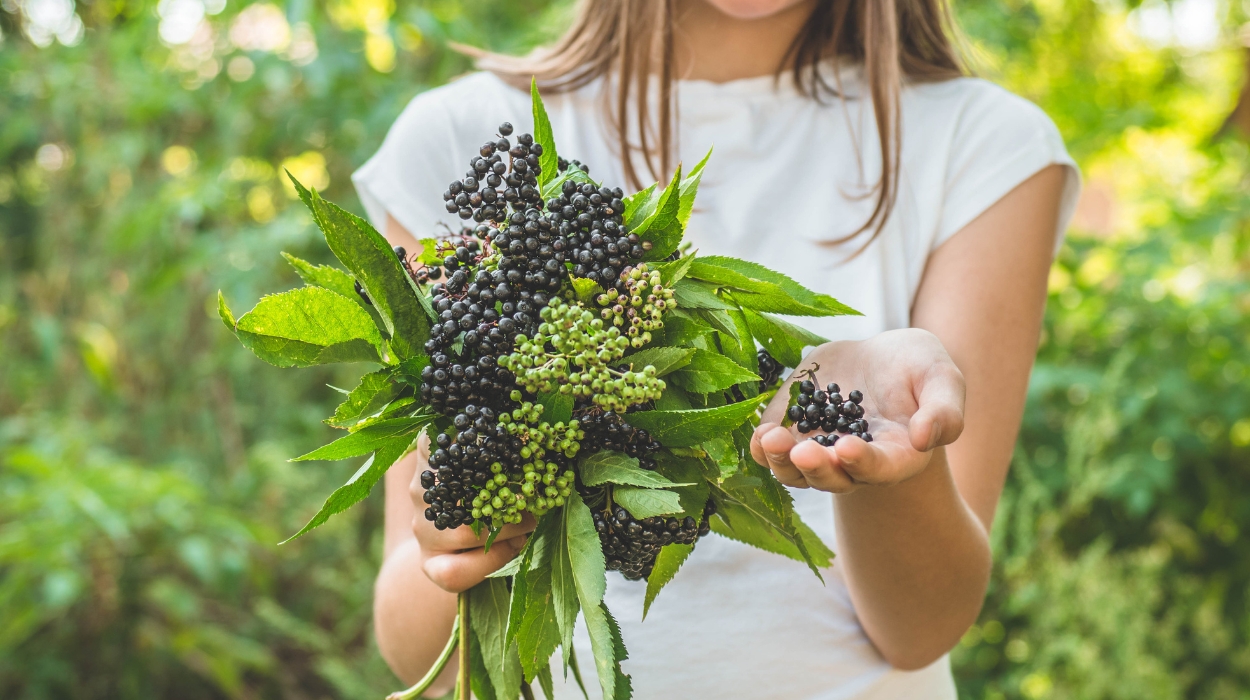Elderberry, or Sambucus nigra, and its health benefits are well-known in the complementary and integrative medicine world. It’s been used in folk medicine for the treatment of colds, flu,[1] and other respiratory symptoms. Elderberries are dark purple and grow in North America, Europe, Asia, and North Africa.
Research involving cooked elderberries indicates they may provide several health benefits due to their naturally occurring bioactive compounds. These compounds found in plants supply additional nutritional value other than macronutrients like carbohydrates and fiber. Bioactive compounds‘[2] benefits include anti-microbial, antioxidant, anti-cancer, neuroprotective, anti-diabetic, heart protective, and anti-inflammatory properties.
Many people look to organic remedies for skin care because of their natural components. Coconut oil, rose hip,[3] and argan oil[3] may be the most recognized skin therapeutics, but interest in elderberry benefits for skin health is growing. The full spectrum of elderberry’s health benefits is being studied, but let us dive into the current research regarding skin care.
Four Benefits Of Elderberries For Skin
Four benefits of elderberries for skin health are:
- Prevents wrinkles and repairs UV-damaged skin cells.
- Prevents breakouts and aids acne treatment.
- Helps fade scars and provides wound healing support.
- Provides moisturizing effects for skin.
Elderberry Benefits For Skin

Elderberry’s Bioactive Components
Skin is the largest organ[4] in the body and part of your immune system. The outer layer or epidermis, protects the body from germs and other potential external harm. The layer underneath is the dermis,[5] which helps regulate temperature, supply nutrients, and maintain hydration. Finally, the innermost layer of the skin is the subcutaneous[5] layer which houses several types of cells including fat cells or adipocytes.[3]
Keeping all of your layers of skin healthy is closely linked to managing overall health. Eating a nutritious balanced diet supports your body’s health including your skin. Consuming adequate amounts of fruits, especially some of the healthiest fruits like berries, is a great way to benefit from health-promoting bioactive compounds.
Elderberry is listed along with several other types of berries that provide skin health benefits. The elderberry plant contains essential nutrients[6] such as protein, fiber, carbohydrates, vitamin C, and some of the B, A, and E vitamin groups.
Elderberry extracts contain high amounts of polyphenols, particularly anthocyanins,[7] and flavonoids. Anthocyanins provide anti-inflammatory and antioxidant properties that reduce inflammatory conditions,[7] such as fighting acne and preventing cardiovascular disease and cancer.
Your level of skin health is associated with the amount of oxidative stress accumulated by environmental factors such as sun damage, a poorly nutritious diet, and other lifestyle pressures. Research indicates phytochemicals like polyphenols can counteract the effects of environmental[6] exposure, such as free radical damage and premature aging.
Specific Skin Benefits Of Elderberry Use
Scientific evidence indicates healthier skin may be found in your garden instead of the cosmetics counter. Elderberry contains natural anti-inflammatory properties that may support healthy skin. Let’s dive into the details of how the elderberry plant may repair skin damage.
Prevents Wrinkles
Wrinkles are a natural part of aging. However, experts report that environmental stressors such as sun damage and lifestyle are also causative factors. Research involving the effects of elderberry extract in UVB-affected human skin keratinocytes investigated whether the extracts showed potential in your skincare routine as a treatment against skin photoaging and inflammation.[8]
Therefore, elderberry extract was efficient in scavenging free radicals meaning it reduced the oxidative stress response of skin cells, essentially reversing the skin’s sun damage. These anti-aging effects can be attributed to its polyphenols and their antioxidant properties.[6]
Prevents Breakouts
Acne is a common skin disorder where pores become blocked due to excess oils, skin is inflamed, and scarring can occur. Recent research reports bacteria[9] plays a role in acne but is not completely understood. New treatment ideas[9] for fighting acne are emerging instead of traditionally used antibiotics.
Flavonoids contained in elderberries[10] are noted for their antibacterial properties and their possible use in treating acne-prone skin. Flavonoids demonstrated a positive antibacterial effect[10] on acne-causing bacteria during an in vivo study, which may prevent breakouts.
Helps Fade Scars
Phytochemicals may also provide wound healing benefits, including healing scar tissue. A study involving elderberry plant extracts and their effects on skin burns demonstrated good wound healing capacity.[4] Rats were treated for 21 days with elderberry extracts in cold cream, and their skin healing outperformed that of the control group.
Research suggests that elderberry leaf extracts[11] may benefit wound healing and decrease inflammatory skin conditions by fighting free radical damage. One study determined increased skin cell activity promoting healing surrounding a wound due to plant extracts.
Moisturizing Effects
Research indicates bioactive compounds like those found in elderberry used in topical applications can penetrate the surface[12] of the skin and improve moisture levels. Polyphenols are being used in cosmetic products for skin hydration due to their skin cell repair components.
Ways To Add Elderberry To Your Skincare Routine

Achieving youthful-looking skin or wanting to decrease signs of aging is a goal for many. More people are searching for natural ingredients versus chemicals in their self-care products. Plant extracts are being used more frequently in cosmetics and skin care products due to their antioxidant, anti-aging, and anti-inflammatory properties.
Products that contain elderberry extracts can improve your skin health. Adding elderberry oil to other topicals like coconut oil is another way to add elderberry to your skincare routine. Remember to drink plenty of water for proper skin hydration.
Dietary Options For Elderberry Usage
Consuming food or beverages containing Sambucus nigra is another option to obtain its health benefits. Elderberry is a popular ingredient in many foods and beverage formulations:[13]
wine, juice, tea, liqueur, jams, and jellies. Elderberry syrup may be used in your hot tea or a smoothie.
However, elderberries must be cooked[14] before consumption, or severe symptoms may arise from the inactivated poisons naturally found in raw elderberries from these medicinal plants.
Elderberry components provide additional health benefits besides attaining beautiful skin.
Its bioactive compounds have a positive effect on the immune system due to their antiviral, antibacterial activity, and antioxidant properties.[6] Elderberry supports protective efforts for heart health, type 2 diabetes, and obesity.
Elderberries are nutrient-rich and offer high antioxidant content. This makes them a great choice when you want to start eating healthier. If you are a snacker, try healthy late-night snacks like cooked berries, versus processed foods, that will support a more nutritious diet.
Studies suggest that elderberry tea may offer[15] pain relief for arthritis and reduce swelling associated with this condition.
Essential nutrients are important for optimal skin health. If you seem to have difficulty consuming a healthy amount of fruits and vegetables you may consider taking dietary supplements. Adding a greens powder to smoothies is another option to improve nutritional intake.
Potential Risks And Precautions
Some potential risks of consuming elderberries are noteworthy. Raw unripe elderberries and other parts of the elder tree, such as the leaves and stem, contain toxic substances[1] that can cause nausea, vomiting, and diarrhea. Cooking eliminates harmful toxins which if consumed in large quantities may cause serious illness.
There continues to be limited information regarding the safety of elderberry[1] use during pregnancy or while breastfeeding. Children and adolescents under the age of 18 are[6] encouraged not to consume elderberry. Pregnant and lactating women should consult their healthcare provider and consumption is not advised due to limited information about it in this population group.
Conclusion
Elderberry has medicinal qualities in addition to its skin benefits. It has been used in folk medicine for a long time for immune support and as a treatment for respiratory conditions.
More recently, scientific evidence indicates health applications for the elderberry plant components in skincare.
Beneficial plant chemicals contained in elderberry have anti-inflammatory, antioxidant, and antibacterial qualities that improve skin conditions. They provide support for tissue repair due to environmental exposure like sun damage and aging pollutants.
Elderberry supplements may be consumed for additional health benefits. Elderberry juice, syrup, and tea are viable options to obtain their beneficial bioactive compounds for overall health. This berry is a fantastic addition to your diet with a growing list of medicinal properties and healthy attributes.
Frequently Asked Questions
Yes, elderberry provides benefits that improve skin health. It has anti-aging properties and can support tissue repair from sun damage.
Yes, elderberry extracts provide support to aging skin cells and aid skin damage repair.
Yes, elderberries can help treat skin-deep acne-causing bacteria and provide skin-healing benefits for acne scarring.
Elderberry improves skin cell healing response to damaged tissue, increases skin hydration, and can decrease inflammatory skin conditions such as acne.
 Evidence Based
Evidence Based
